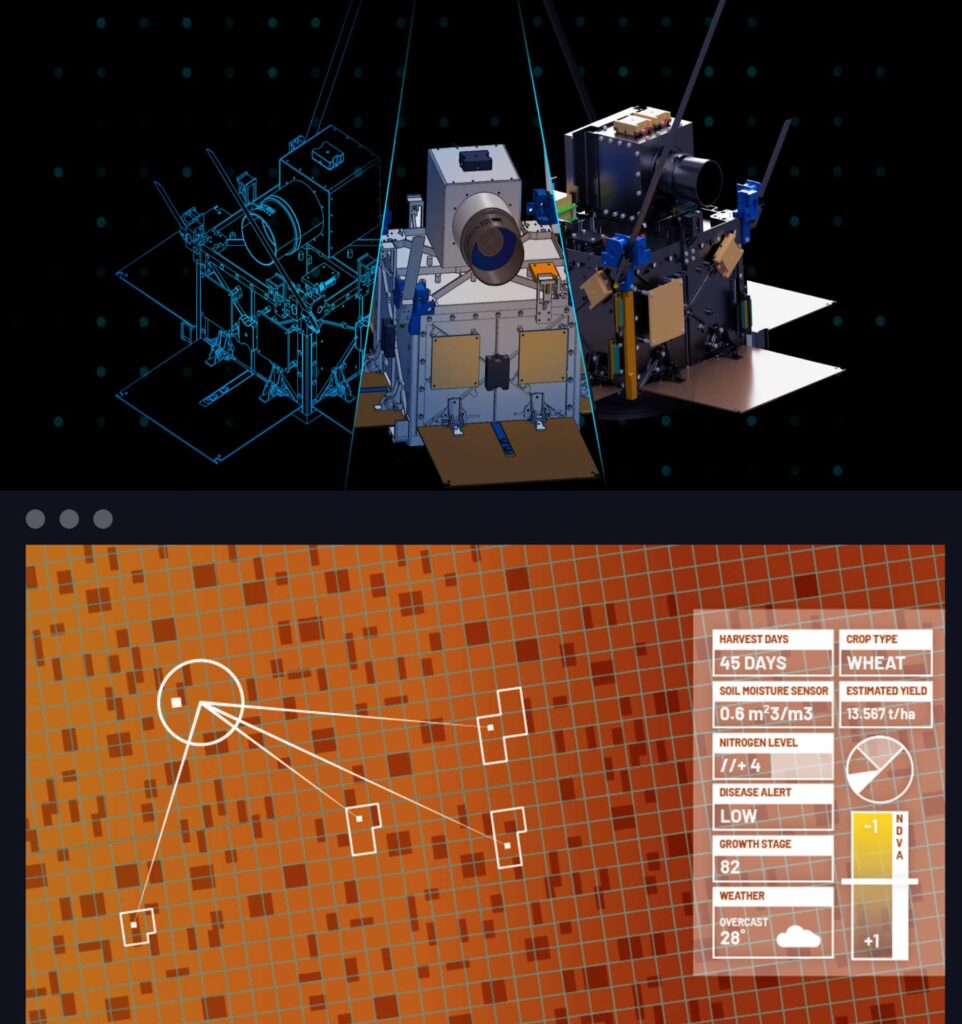Pixxel, a spacetech start-up, was founded by two BITS Pilani graduates in February 2019 against all odds. The small-town duo of Awais Ahmed and Kshitij Khandelwal pursued their dreams to build India’s very own equivalent SpaceX, one that would help keep vigilance on the planet Earth from space. With a tagline of ‘Seeing the Unseen,’ Pixxel’s primary goal is to build a health monitor for planet Earth with the help of a constellation of advanced hyperspectral satellites. Through Pixxel, the founders aim to give the world omnipresent eyes on the blue planet, thereby helping to churn out data needed for building a sustainable future.
Pixxel: From a Dream to a Reality
When we think about the Indian space tech start-ups, we generally tend to picture a bunch of scientists who are well past their youth as the driving forces behind the initiative. The young indulging in the space tech segment is still a relatively rare sight for many. However, in a dramatic turn of events, two 22-year-old space enthusiasts from BITS Pilani have made history by developing Pixxel to put constellation satellites of the highest imagery resolution in a sun-synchronous orbit. Awais Ahmed and Kshitij Khandelwal have collectively pulled off an uphill task through their dint of sheer hard work and commitment.
Awais Ahmed optimistically predicted two years ago that through Pixxel, he and Kshitij were looking forward to building their first satellite by 2021, which would then continue to expand. What started as a mere dream back in May 2018 has manifested into reality today. Pixxel is also set to make a world record for making the highest resolution hyperspectral imaging satellites.
The Birth of Pixxel
Awais Ahmed and Kshitij Khandelwal hail from the Indian suburbs. They were both driven by science and technology ever since their childhood. During their college days at BITS Pilani, the two became friends and became part of their college team called ‘Hyperloop India’. To his credit, Awais Ahmed, in fact, was one of the founding members of ‘Hyperloop India’.
Team Hyperloop India is a non-profit multi-stakeholder consortium of 60+ student volunteers and organisations interested in reinventing transportation in India. Students from several other BITS campuses then accumulated in no time for the cause and started communicating with SpaceX, the American private aerospace giant founded by Elon Musk.
This then led them to participate in the Hyperloop Pod Competition in 2017, organised by SpaceX. They presented a working Hyperloop pod prototype to Elon Musk at the SpaceX headquarters in Los Angeles. Coincidently, Ahmed and Khandelwal happened to be the only two Indian finalists of the competition, with their team being one of the two Asian finalists.
This merit was the benchmark for even greater things to come in the lives of Ahmed and Khandelwal. The boost in morale that the duo got from the competition led them to ponder over participating in the IBM Watson AI XPRIZE Competition in February 2018. They began developing AI models that could capture satellite imagery and develop solutions for a sustainable future. It was at this time that the duo encountered a significant hurdle.
They found out that the satellite imagery that was captured was years old, and for them to come up with any amicable solutions and data, the images had to be up to date. Thus, Ahmed and Khandelwal dodged the second competition for the time being and instead focused on developing satellites capable of capturing earth’s real-time images. This marked the birth of Pixxel.
What is Pixxel All About?
To go by the definition, Pixxel is basically a space data company that has developed a constellation of hyperspectral earth imaging satellites. In addition to keeping vigilance through satellites, Pixxel also facilitates the analytical tools to examine insights from the extracted data. The fundamental objective of this start-up is to detect, monitor and predict global phenomena from the vantage point in space.
Earlier headquartered in both Chennai and Bangalore, Pixxel is now being shifted entirely to Bangalore. Pixxel’s hyperspectral constellation is installed in such a manner that it beams down ten times more information than any other satellite revolving in orbit today. In doing so, Pixxel serves itself as a medium of utter helpfulness when it comes to building a sustainable planet- ranging from the agricultural sector to the mining sector.
‘‘
Pixxel's hyperspectral constellation is installed in such a manner that it beams down ten times more information than any other satellite revolving in orbit today.
Shaping a Unique Start-up Model
The business model that Pixxel has been moulded into by and large follows the footprints of other private aerospace manufacturing companies of the US, such as the likes of SpaceX, Boeing, Lockheed and so on. Essentially being made on a B2B model, Pixxel’s satellites are designed to provide global coverage every day once it becomes fully functional. The data will be used by organisations and businesses alike to detect, monitor and predict global phenomena in agriculture, oil and gas, climate change, forestry, and urban planning, to name a few sectors.
Pixxel also holds the record of raising the highest ever amount in seed funding. So far, it has raised a total of a staggering $7.3 million in funding, which speaks for the unmatched potential that this space tech company carries. This has also led established institutional venture capital firms like Lightspeed India and Blume Ventures to make their first-ever investment in this particular sector. Additionally, Pixxel has already signed memorandums of understanding (MOUs) and letters of intent with leading agricultural and oil and gas firms from both the United States and India.
Utilising the Assets within
Having skimmed through the advantages of Pixxel, these advantages must be channelised into the right path to incur the best possible outcomes through the investment. Stakeholders can utilise this constellation of satellites for a sustainable future in multiple sectors, some of which are as follows:
AGRICULTURE:
Pixxel’s technology can be used to monitor the condition of crops, detect variations and improvise yield. This can be done by covering large areas daily, supplemented with up-to-date data. It can serve as an asset in distinguishing crop species from weeds. It can also identify nutrient deficiencies through advanced spectral signatures. Lastly, it can also be pivotal in forecasting pest infections on crops through its high-resolution images.
ENVIRONMENT:
Environmentally speaking, Pixxel can also be used to map and monitor forests. It can play an instrumental role in reversing deforestation. It can be used to calculate climate risks such as floods, famine and detect sinister materials to take timely measures to curtail them.
GOVERNMENT:
In context to the government aid, Pixxel can identify military resources and troop movement to aid them with relief measures. It can be used to keep vigilance on waterways, rail-road conditions at both regional and national levels. It can also detect unforeseen natural calamities for the government to take immediate relief measures.
MINING:
Pixxel can be a boon when it comes to mining. By providing quick and direct insights about the earth’s surface, it could help chart out accurate mineralogical information about inaccessible locations.

Examining Pixxel’s Reach and Influence
Pixxel’s influence so far has quite evidently reverberated throughout the nation and beyond. Since it aims to keep vigilance on the entire planet from space, it could be utilised for the greater good of any given country. It detects not only environmental and humane issues but also provides amicable solutions for them. Simply put, in comparison to any other satellite in orbit, Pixxel’s are more frequent, consistent and of higher quality. This is primarily due to the edge that Pixxel has over other satellites regarding targeted monitoring, localised problem detection and hyper optimised solutions.
In a 2019 interview at the ORF Kalpana Chawla Space Policy Dialogues, CEO and co-founder of Pixxel Awais Ahmed revealed that Pixxel had been working on the manufacturing of nanosatellites that would not exceed the size of a shoebox- a maximum of 16 kilograms. The lightweight quality of the Pixxel satellites is another massive advantage that the start-up has over its counterparts.
Reasons behind the Success
Awais Ahmed cited that there is no space policy as such in India, unlike that of the United States, which posed a significant hurdle for them. Secondly, he also expressed his concerns over a lack of investors in space tech start-ups in the Indian context instead of those of the UK, China, or the US. That being said, the BITS Pilani duo Ahmed and Khandelwal, despite coming across numerous obstacles, always kept their self-belief up by not letting doubts hover over their abilities.
The Pixxel crew has not held back even in the case of marketing and branding strategy. They have come up with an enticing website, to say the least, where even users alien to the subject of space technology can grasp an overall understanding with ease. On top of it, Pixxel has also deployed several media organisations to publish content regarding them- from the Times of India to the Economic Times, which helped them garner even greater heights of publicity. This has also led them to attract top notch investors.
CEO and co-founder of Pixxel, Awais Ahmed, revealed that Pixxel had been working upon the manufacturing of nanosatellites that would not exceed the size of a shoebox- a maximum of 16 kilograms.
‘‘
There are already plenty of other satellites revolving around the orbit. However, one aspect where the Pixxel satellites outshine their counterparts is providing in-depth insights about the blue planet.
How Pixxel’s Products Stand Out in the Spacetech Community
You might be wondering what makes Pixxel so unique despite there being several other private space tech companies in India. Pixxel is a space tech start-up that is the brainchild of two final year college students – that in itself is an inspiration for all the budding entrepreneurs out there. While providing hyperspectral images of the highest resolution available in the market speaks of their unmatched intelligence.
Although some might argue that there are already several private space tech companies in the country, indicating no need for other space tech start-ups, Pixxel possesses some outstanding features that make it stand out from the competition. Compared to other satellites, Pixxel’s satellites provide real-time sensing data at an unprecedented level of detail. With a 5M spatial resolution that personifies their class and over 300 brands of information richness, its devices also have a jaw dropping revisit frequency of 24 hours.
THE WAY FORWARD IN PIXXEL’S JOURNEY
It can undoubtedly be concluded that Awais Ahmed and Kshitij Khandelwal have set an example for thousands of others to aspire to. As things stood in late 2020, Pixxel was on its way to launch its first-ever constellation of satellites named ‘Anand’ in 2021on the PSLV-C51 rocket.
However, it was announced just a week before its launch that Pixxel would not go ahead with it due to inevitable glitches in technicality noticed during testing. As per a top company official, it now plans to launch a constellation of 30 small earth observation satellites by 2022.
Besides their expertise in the space tech aspect, it was Ahmed and Khandelwal’s self-belief and ‘never say never’ attitude that paved the way for their success that is visible today to the entire world. With Pixxel, these two entrepreneurs have indeed marked their name in history books and will most likely continue to blaze a path of innovation in future.
–For more inspiring stories, read our Inspire section!




